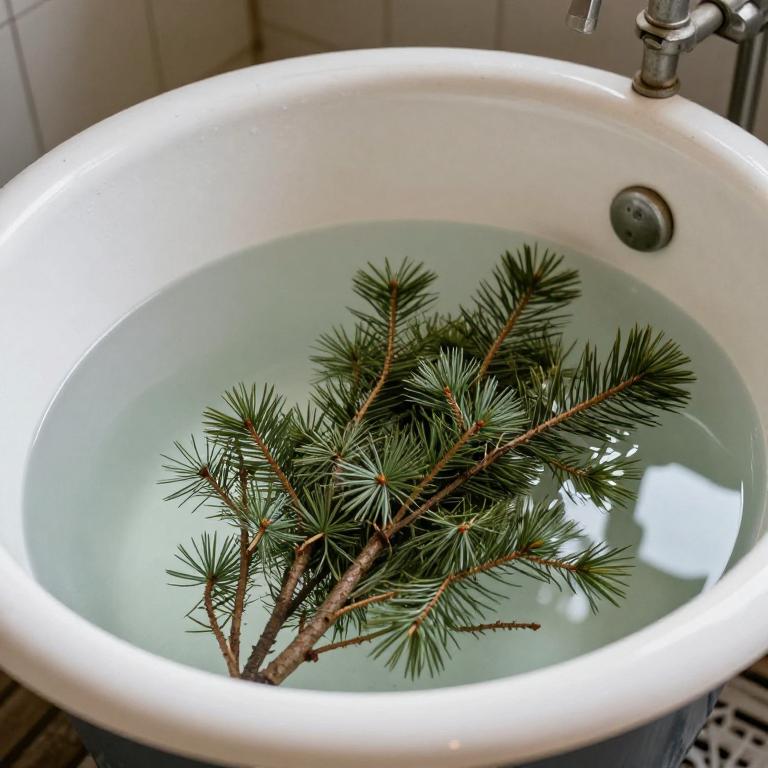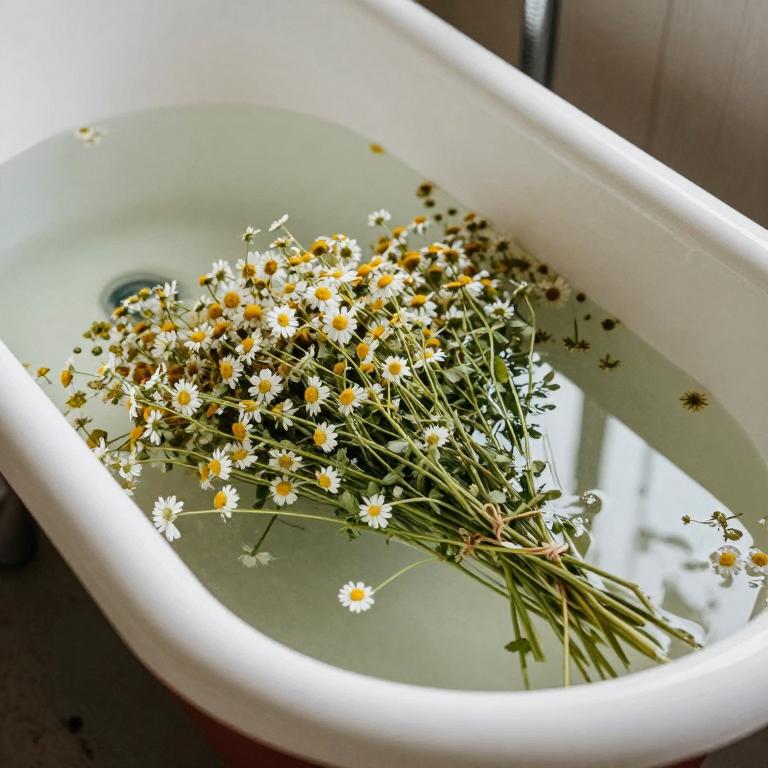10 Best Herbal Baths For Coughing Fits

Herbal baths can be a soothing remedy for individuals experiencing coughing fits, as the steam and essential oils from certain herbs can help ease respiratory discomfort.
Ingredients like eucalyptus, lavender, and chamomile are commonly used in herbal baths for their calming and anti-inflammatory properties. The warmth of the bath helps to open up the airways, making it easier to breathe and potentially reducing the frequency and intensity of coughing. To prepare an herbal bath, simply add a few drops of essential oils or a handful of dried herbs to warm water and soak for 15 to 20 minutes.
While herbal baths may not cure a cough, they can provide relief and promote relaxation, supporting overall respiratory health.
Table of Contents
- 1. Eucalyptus (Eucalyptus globulus)
- 2. Thyme (Thymus vulgaris)
- 3. Peppermint (Mentha piperita)
- 4. English lavender (Lavandula angustifolia)
- 5. Scots pine (Pinus sylvestris)
- 6. Chamomile (Matricaria chamomilla)
- 7. Salvia (Salvia officinalis)
- 8. Black elderberry (Sambucus nigra)
- 9. Ginger (Zingiber officinale)
- 10. Basil (Ocimum basilicum)
1. Eucalyptus (Eucalyptus globulus)

Eucalyptus globulus, commonly known as Australian tea tree or blue gum, is often used in herbal baths to alleviate symptoms of coughing fits.
The essential oils derived from this plant contain compounds like cineole and terpenes, which have anti-inflammatory and decongestant properties. When added to warm water in a bath, these oils can help open up airways and reduce throat irritation, making it easier to breathe. The steam from the bath also enhances the inhalation of these beneficial compounds, providing a soothing effect on the respiratory system.
While not a cure, eucalyptus globulus herbal baths can be a natural and calming remedy to ease the discomfort of persistent coughing.
2. Thyme (Thymus vulgaris)

Thymus vulgaris, commonly known as thyme, has been traditionally used in herbal baths to alleviate symptoms associated with coughing fits.
The essential oils and volatile compounds in thyme possess antimicrobial and expectorant properties that can help loosen mucus and reduce irritation in the respiratory tract. When infused into bath water, thyme can promote relaxation and ease the breathing process, offering a soothing effect on the chest and throat. This traditional remedy is often combined with other herbs like eucalyptus or lavender to enhance its therapeutic benefits.
While herbal baths can provide symptomatic relief, they should not replace medical treatment for severe or persistent coughing.
3. Peppermint (Mentha piperita)

Mentha piperita, commonly known as peppermint, is often used in herbal baths to alleviate symptoms of coughing fits due to its soothing and decongestant properties.
When added to warm bath water, the essential oils from peppermint leaves can help relax the respiratory muscles and ease breathing, providing relief from persistent coughing. The aromatic vapors from the bath may also help open up the airways and reduce inflammation in the throat, making it easier to manage coughing episodes. This natural remedy is particularly beneficial for individuals seeking a gentle, non-pharmacological approach to respiratory discomfort.
Overall, peppermint herbal baths offer a calming and therapeutic way to support respiratory health during periods of frequent coughing.
4. English lavender (Lavandula angustifolia)

Lavandula angustifolia, commonly known as English lavender, has been traditionally used in herbal baths to soothe respiratory discomfort, including coughing fits.
The calming and anti-inflammatory properties of lavender essential oil can help reduce inflammation in the airways and ease the frequency and intensity of coughing. When added to warm bath water, lavender essential oil promotes relaxation, which can indirectly alleviate coughing by reducing stress-related bronchial constriction. Its aromatic compounds also have a mild antiseptic effect, helping to clear mucus and improve breathing.
For best results, a few drops of lavender essential oil can be mixed with a carrier oil and added to the bath, allowing the body to absorb its therapeutic benefits through the skin.
5. Scots pine (Pinus sylvestris)

Pinus sylvestris, commonly known as Scots pine, has been traditionally used in herbal baths to alleviate symptoms of coughing fits due to its calming and anti-inflammatory properties.
The essential oils extracted from the needles of this tree contain compounds like pinene and camphor, which are known to soothe respiratory discomfort and ease bronchial congestion. When infused into bathwater, these oils can help relax the muscles around the airways, reducing the intensity and frequency of coughing episodes. The warm, aromatic environment of the bath also promotes relaxation, which can further ease the body's response to respiratory irritation.
While not a substitute for medical treatment, pine baths may offer natural relief and support in managing mild coughing symptoms.
6. Chamomile (Matricaria chamomilla)

Matricaria chamomilla, commonly known as chamomile, has been traditionally used in herbal baths to soothe respiratory discomfort and alleviate coughing fits.
The calming properties of chamomile essential oils can help reduce inflammation in the airways and ease irritation, making it beneficial for those suffering from persistent coughing. To prepare a chamomile bath, steep a handful of dried chamomile flowers in hot water for several minutes, then add the infused water to a tub of warm water. Soaking in this bath can promote relaxation and ease breathing, offering natural relief from coughing symptoms.
While chamomile baths are generally safe, individuals with allergies to plants in the daisy family should exercise caution and consult a healthcare provider before use.
7. Salvia (Salvia officinalis)

Salvia officinalis, commonly known as sage, has been traditionally used in herbal baths to soothe coughing fits by leveraging its anti-inflammatory and antimicrobial properties.
When infused into bath water, sage can help ease respiratory discomfort and reduce irritation in the throat and airways. The steam from the warm bath allows the essential oils and compounds in sage to be inhaled, providing a natural remedy for persistent coughing. This method is particularly beneficial for those seeking a gentle, non-pharmacological approach to managing cough symptoms.
Overall, sage herbal baths offer a calming and aromatic way to support respiratory health and alleviate the discomfort of frequent coughing fits.
8. Black elderberry (Sambucus nigra)

Sambucus nigra, commonly known as elderberry, has been traditionally used in herbal remedies for its potential anti-inflammatory and antiviral properties.
When infused into bath water, sambucus nigra can help soothe the respiratory system and ease symptoms associated with coughing fits by promoting relaxation and reducing irritation in the airways. The warmth of the bath enhances the absorption of the herb's beneficial compounds through the skin, offering a holistic approach to relief. This method is particularly beneficial for those seeking natural alternatives to conventional cough suppressants.
However, it is important to consult with a healthcare provider before using sambucus nigra, especially for individuals with allergies or underlying health conditions.
9. Ginger (Zingiber officinale)

Zingiber officinale, commonly known as ginger, has been traditionally used in herbal baths to alleviate symptoms of coughing fits due to its warming and anti-inflammatory properties.
When added to bath water, ginger can help relax the respiratory muscles and ease bronchial congestion, providing relief from persistent coughing. The aromatic compounds in ginger also have a soothing effect on the nervous system, which can reduce the frequency and intensity of coughing episodes. A ginger-infused bath promotes relaxation and may help reduce stress-related coughing, which is often exacerbated by anxiety or tension.
Overall, incorporating zingiber officinale into a herbal bath can be a natural and effective complementary therapy for managing coughing fits.
10. Basil (Ocimum basilicum)

Ocimum basilicum, commonly known as holy basil, has been traditionally used in herbal remedies for its calming and anti-inflammatory properties.
When used in a herbal bath, holy basil can help soothe respiratory discomfort and ease coughing fits by promoting relaxation and reducing irritation in the airways. The aromatic compounds in basil leaves release a soothing scent that may help ease breathing and reduce stress, which is often a contributing factor to persistent coughing. To prepare the bath, steep fresh or dried holy basil leaves in hot water for several minutes, then add the infusion to warm bath water.
Regular use of this herbal bath may provide relief for individuals experiencing frequent or persistent coughing, though it is advisable to consult a healthcare professional for persistent or severe symptoms.